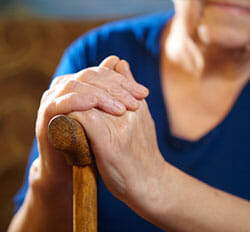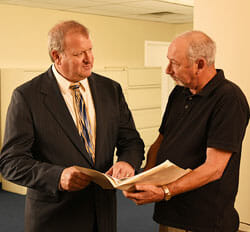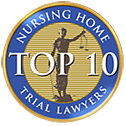Signs and Symptoms of Elder Abuse in Maryland
 When visiting a loved one in a nursing home, you might be startled to see something that makes you question the care they are receiving. You trust the facility to provide the best possible care, but it looks like that’s not happening. It’s unthinkable after searching for the perfect home away from home, but residents of care facilities can become victims of abuse or neglect.
When visiting a loved one in a nursing home, you might be startled to see something that makes you question the care they are receiving. You trust the facility to provide the best possible care, but it looks like that’s not happening. It’s unthinkable after searching for the perfect home away from home, but residents of care facilities can become victims of abuse or neglect.
Elder abuse doesn’t discriminate: it affects seniors across all socioeconomic classes, cultures and races. Studies of the issue show that the older a patient is, the more likely they are to be abused and that women are more likely than men to be victims.
Nursing home residents are vulnerable. They rely on caretakers to meet their needs. Sometimes that trusted relationship goes wrong. As a concerned family member or friend, there are signs to look for if you’re worried that your loved one might be in an abusive setting. And if you happen to notice that another resident appears to be abused or neglected, consider speaking up for them. They may not have anyone who visits them, may be afraid to tell or may even be medically unable to speak or remember.
What is Elder Abuse?
Although nursing homes are regulated by government agencies that investigate and punish cases of abuse and neglect every year, officials cannot be everywhere at once. Do your part by being aware of possible danger signs and be ready to act if they appear. The Maryland Department of Aging and the Office of Healthcare Quality advocates for elder abuse prevention and is a good source of information about what types of things should be alarming. Any time the staff refuses to allow visitors to see a resident, delays in allowing a visit, or does not allow visitors to be alone with the resident, you should be concerned.
Signs That Might Indicate Physical Abuse:
- Unexplained bruises or broken bones
- Grip marks on arms or neck, restraint marks on wrists or ankles
- Slap marks
- Burns or blisters
- Multiple injuries
- Weight loss
- Symptoms of being over-medicated.
Signs That Might Indicate Psychological Abuse:
- Acts fearful
- Unresponsive, uncommunicative
- Shows lack of interest in socializing
- Undergoes sudden personality change
- Evades questions
- Exhibits antisocial behavior.
Signs That Might Indicate Sexual Abuse:
- Bruises around the breasts or genital area
- Torn underclothing
- Unexplained vaginal or anal bleeding
- Genital infections, venereal disease
- Acts withdrawn.
Signs That Might Indicate Financial Abuse:
- Frequent checks or gifts to caregiver
- Sudden change in finances
- Unusual bank account activity
- Personal belongings missing.
Signs That Might Indicate Neglect:
- Malnutrition or dehydration
- Bedsores or pressure ulcers
- Filthy surroundings
- Basic hygiene ignored, clothing unclean
- Medical instructions not being followed
- Glasses, hearing aids, false teeth not provided.
Protected by State Law
It’s against the law for anybody in the state of Maryland who is in a caretaking position to abuse or neglect an elderly person by any means. Offenders can and should be prosecuted criminally.
Maryland law also requires any health practitioner, police officer, or human service worker who has reason to believe that a vulnerable adult is in danger — or has been subjected to abuse, exploitation, or neglect — to report their observations to the local Adult Protective Services department.
Never assume that somebody else has already addressed the situation. Take action and ask questions. Report any concerns that you have.
Call 1-800-91-PREVENT (1-800-917-7383) to reach Maryland Adult Protective Services.
Our Maryland Nursing Home Lawyers Can Help
 If you believe that your loved one has suffered an injury,a decline in their condition or death due to the care they have received at a nursing home, contact the nursing home abuse and neglect attorneys at the Law Offices of Roger S. Weinberg, LLC, to discuss holding the facility responsible.
If you believe that your loved one has suffered an injury,a decline in their condition or death due to the care they have received at a nursing home, contact the nursing home abuse and neglect attorneys at the Law Offices of Roger S. Weinberg, LLC, to discuss holding the facility responsible.
We will investigate the matter and take the legal action necessary to protect your loved one and to recover financial compensation for the damage that was done. We have successfully handled countless nursing home abuse and neglect cases, and we do so compassionately and aggressively.
The Law Offices of Roger S. Weinberg, LLC, is a recognized elder abuse litigation law firm that largely focuses on holding nursing homes and assisted living facilities accountable. The firm also protects developmentally disabled individuals from the abuse and neglect that is often found in group homes. Our founding attorney, Roger S. Weinberg, has been a lawyer for over 30 years. He has lectured nationally and written educational articles for the American Association for Justice and the Maryland Association for Justice. In 2001, he founded and was the first chairperson of the Maryland Trial Lawyer’s Association’s Nursing Home Litigation Section (now MAJ). Put his experience to work for you by calling 410-825-3161 or filling out this online form.


 Roger Weinberg is a skilled and experienced attorney who has pioneered the legal field of representing Nursing Home, Assisted Living, and Developmental Disability victims and their families who have experienced abuse, neglect and wrongful death. He is a leader in this field and teaches other lawyers, students and medical personnel about the laws impacting such cases. [
Roger Weinberg is a skilled and experienced attorney who has pioneered the legal field of representing Nursing Home, Assisted Living, and Developmental Disability victims and their families who have experienced abuse, neglect and wrongful death. He is a leader in this field and teaches other lawyers, students and medical personnel about the laws impacting such cases. [ 



